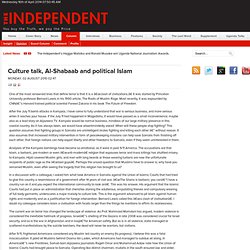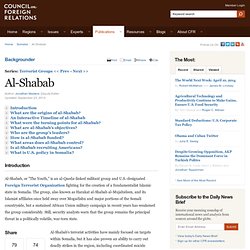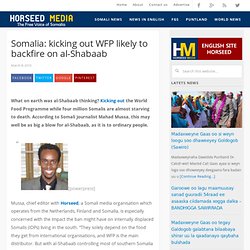

ADL Terrorist Symbol Database. Name Variations Al Shabab, Harakat Shabaab Al Mujahidin, Mujahidin Al Shabaab Movement, the Youth, Mujahideen Youth Movement, Hizbul Shabaab, Al Shabaab al-Islamiya, Youth Wing, Al Shabaab al Islam, Al Shabaab al Jihaad, the Unity of Islamic Youth.

Overview Al Shabaab (Arabic for “the youth”), an Islamic militant group that seeks to create an Islamic state in Somalia, formed in 2004 as the militant wing of the Islamic Courts Union (ICU), a network of Islamist militant tribes that controlled southern and central Somalia. Al Shabaab has waged an insurgency against Somalia’s transitional governments and its Ethiopian supporters since the ICU lost power in December 2006. Fighting between Al Shabaab and Somali government forces have flared since May 2009. Although the group primarily targets Somali governmental officials and Ethiopian military forces, it has also conducted attacks against African Union Mission forces and international peacekeepers inside Somalia. Focus of Operations Somalia. Al Shabaab Capture Baydhabo. Al-Shabaab - Terrorist Groups.
The Harakat Shabaab al-Mujahidin—commonly known as al-Shabaab—was the militant wing of the Somali Council of Islamic Courts that took over most of southern Somalia in the second half of 2006. Despite the group’s defeat by Somali and Ethiopian forces in 2007, al-Shabaab—a clan-based insurgent and terrorist group—has continued its violent insurgency in southern and central Somalia. The group has exerted temporary and, at times, sustained control over strategic locations in those areas by recruiting, sometimes forcibly, regional sub-clans and their militias, using guerrilla warfare and terrorist tactics against the Somali Federal Government (SFG), African Union Mission in Somalia (AMISOM) peacekeepers, and nongovernmental aid organizations. As evidenced by the increasing levels of infighting among leadership, al-Shabaab is not centralized or monolithic in its agenda or goals. Culture talk, Al-Shabaab and political Islam. Monday, 02 August 2010 02:47 One of the most renowned lines that define terror is that it is a “clash of civilizations.†It was started by Princeton University professor Bernard Lewis in his 1990 article, The Roots of Muslim Rage.

Most recently, it was expounded by CNN’s Harvard trained political scientist Fareed Zakaria in his book The Future of Freedom. After the July 11 bomb attacks in Kampala, I have come to fully understand that war is serious business, and more serious when it reaches your house. If the July 11 had happened in Mogadishu, it would have passed as a small inconvenience; maybe also as a lead story on Aljazeera TV.
Kampala would be normal business, mindless of our large military presence in this coastal country. Analyses of the Kampala bombings have become so emotional, as it were in post 9/11 America. The current war on terror has changed the landscape of violence. After 9/11, frightened Americans considered any Muslim led country an enemy (to progress). Al-Shabaab's Weapons Catalogue. In the past few months there has been constant perfections and enrichments of Improvised Explosive Devices (IED’s) made by the Al-Shabaab, a most feared extremist group linked to Al-Qaeda, this militant group has achieved in recent months a number of organized explosive missions carried out by it’s well trained soldiers targeting the bases and centers of the African Union Peace keeping troops in Somalia and the interim government of Somalia.

The attacks launched by Al-Shabaab are believed to include suicide attacks and roadside bomb blasts. All the suicide attacks and roadside explosions organized by Al-Shabaab has caused major losses to AMISOM and TFG, so this clarifies that the insurgent group used additional methods with more improvised explosive devices for carrying out such these operations without bringing failure to its target missions. Al-Shabaab. Introduction Al-Shabab, or "The Youth," is an al-Qaeda-linked militant group and U.S.

-designated Foreign Terrorist Organization fighting for the creation of a fundamentalist Islamic state in Somalia. The group, also known as Harakat al-Shabab al-Mujahideen, and its Islamist affiliates once held sway over Mogadishu and major portions of the Somali countryside, but a sustained African Union military campaign in recent years has weakened the group considerably.
Still, security analysts warn that the group remains the principal threat in a politically volatile, war-torn state. Al-Shabab's terrorist activities have mainly focused on targets within Somalia, but it has also proven an ability to carry out deadly strikes in the region, including coordinated suicide bombings in Uganda's capital in 2010 and a deadly raid on a Nairobi mall in 2013. Somalia: kicking out WFP likely to backfire on al-Shabaab. What on earth was al-Shabaab thinking?

Kicking out the World Food Programme while four million Somalis are almost starving to death. According to Somali journalist Mahad Mussa, this may well be as big a blow for al-Shabaab, as it is to ordinary people. [powerpress] Mussa, chief editor with Horseed, a Somali media organisation which operates from the Netherlands, Finland and Somalia, is especially concerned with the impact the ban might have on internally displaced Somalis (IDPs) living in the south. “They solely depend on the food they get from international organisations, and WFP is the main distributor. Al-Shabaab claim ‘ridiculous’ The United Nations says nearly four million people, about half the country’s population, need emergency food aid.